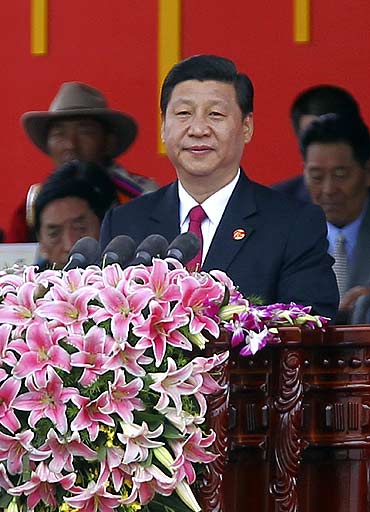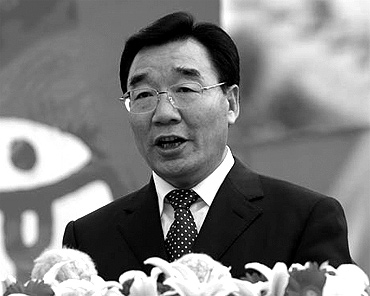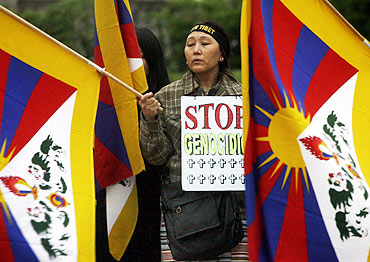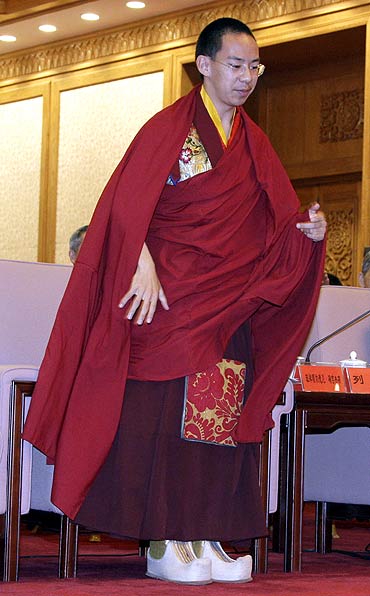 | « Back to article | Print this article |
Why Xi Jinping's visit to Tibet is important
The visit of the Chinese Vice President Xi Jinping to Tibet to celebrate the 60th anniversary of the 17-point agreement between China and Tibet is important for several reasons.
First, in one year, Xi will replace Hu Jintao as the President of the People's Republic of China; he will also assume the mantle of general secretary of the Chinese Communist Party and a few months later, he will take control of the all-powerful People's Liberation Army as the chairman of the Central Military Commission.
Xi has then a strong past connection with Tibet through his father Xi Zhongxun who was responsible for Tibet's affairs in the 1980s. It is also a fact that visits to the Roof of the World by high dignitaries from Beijing are as rarified as the air on the plateau.
When he was still vice president in May 2001, Hu Jintao visited Lhasa (Hu was promoted to the supreme post). His speech was not very different from the one Xi just delivered on the square in front of the Potala.
Hu had declared, "The peaceful liberation of Tibet was a major event in modern Chinese history and an epoch-making turning point in the course of development in Tibet. It symbolised that Tibet once and for all cast off the yoke of imperialist aggression and that the great unity of the Chinese nation and its great reunification cause have entered a new period of development. It ushered in a new era in which Tibet would turn from darkness to light, from backwardness to progress, from poverty to affluence and from seclusion to openness."
Ten years later, foreigners were not allowed into Tibet for a month around the visit of Xi.
Click NEXT to read further...
Xi Jinping's Tibet visit was unusual
However, Xi's visit was unusual, as it did not coincide with the 60th anniversary date of the signature of the 17-point agreement considered by Beijing to be the crucial document proving that Tibet was 'peacefully liberated' and not invaded in 1950-51.
Interestingly, his visit to Lhasa was the second occasion to celebrate the event. It is strangle and rare in the annals of the PRC that a second celebration is organised, nearly two months after the anniversary day (May 23). Chinese are usually meticulous about dates. Some observers have presumed that it was due to Jinping's tight schedule.
Analysts had earlier wondered why the May celebrations were on such a low key. Only after the second 'celebration' of 17-point agreement was announced, did one realise the 'real thing' was to be presided over by the PRC's vice president himself.
Purpose of Xi's visit: Selecting Zhang Qingli's sucessor
At the time of the first celebration, many had concluded that Zhang Qingli, the party boss in Tibet, was out of favour with Beijing. The point is that Zhang's term is soon coming to an end, as he has been serving in Tibet since November 2005 (and he officially became party secretary in May 2006). One of the stakes of Xi's visit to Tibet is the selection of a successor for Zhang Qingli.
Zhang has been one of the most unpopular Chinese leaders to serve in Tibet in recent years (as was one of his predecessors called Hu Jintao, who served in the 'autonomous region' between 1989 and 1992).
Zhang did not endear the Dalai Lama's supporters when he accused the Tibetan leader of being 'a wolf in monk's garb'.
The selection of a more popular party secretary could go a long way to appease the resentment of the Tibetan population vis-a-vis the Han Chinese. It could radically change the atmosphere, if not pave the way for a better understanding with the Dalai Lama and his followers.
Will Padma Thinley (alias Pema Choling), the present chairman of the Tibetan Autonomous Region, be the first ethnic Tibetan to run the affairs of the region? It remains doubtful that Beijing could trust a Tibetan for such an important job.
After his visit to Lhasa, Xi is bound to have a clearer picture (and larger say) in the selection process.Visit of Hu Yaobang to Tibet
In 1980, the then Party General Secretary Hu Yaobang's visit was of different calibre. During a party meeting organised to celebrate the 1951 agreement, Hu gave an unusual speech to some 5,000 cadres in Lhasa, "Our present situation is less than wonderful because the Tibetan people's lives have not been much improved. There are some improvements in some parts, but in general, Tibetans still live in relative poverty. In some areas the living standards have even gone down."
"We comrades in the central committee, chairman Hua [Guofeng] as well as several vice-chairmen, were very upset when we heard about this situation. We feel that our party has let the Tibetan people down. We feel very bad! The sole purpose of our Communist Party is to work for the happiness of people, to do good things for them. We have worked nearly 30 years, but the life of the Tibetan people has not been notably improved. Are we not to blame," he asked.
Xi did not go that far. He vowed to improve people's well-being, maintain social stability in Tibet and fight separatist activities of the 'Dalai Lama's group', stating, "To speed up development holds the key to resolving all issues in Tibet".
A small detail, the English translation did not use the usual term 'Dalai's clique', much more pejorative than 'group'. Was it a sign of conciliation?
Again and again Xi spoke about 'stability'; he explained that Beijing's objective is to ensure that people of all ethnic groups in the autonomous region have access to education, employment, medical and old-age care and housing. "We should stick to the idea that Han and ethnic minorities cannot live without each other," he affirmed.
Xi emphasised on stability of the region
Several other generals such as General Wang Jianping, commander of the People's Armed Police Forces, responsible for the 'stability' in restive regions like Tibet or Xinjiang were in attendance. General Wang is said to be one of new rising stars. He was promoted twice in 2009. He had also served as commander of the Tibet Autonomous Region.
Referring to the recurrent unrest, Xi spoke of improving the armed forces "capabilities in taking preventative actions and handling emergency situations".
He had a special meeting with senior PLA and PAPF officers. He told them, "The social stability in Tibet matters to the country's stability, and Tibet's security matters to national security," advising the officers to always "be sober-minded".
He praised the PLA and PAPF units in Tibet as staunch forces and loyal guardians protecting national borders, safeguarding the socialist modernisation and upholding social stability in Tibet.
He emphasised the importance of Tibet 'as an important national security screen for the country". 'National security screen' is rather poetic to describe the disputed border with India, but Jinping did not want to create more waves with China's southern neighbour, by making shattering declarations. This was not the purpose of the visit.
Later, he pointed out the environmental issues faced by the plateau stating that Tibet was "an important ecological security screen, a major base of strategic resources reserve". He was probably thinking about the Asian rivers originating from the Tibetan plateau.
'Ethnic Tibetans need to understand separatist activities lead to disasters'
For the first time a senior leader ventured into an area extremely close to the Indian border. Xi visited to Bayi, the capital town of Nyingtri (Chinese: Nyingchi) a modern Chinese town on the banks of River Nyang (a tributary of the Brahmaputra).
Nyingtri county is also the base for a purported mega dam on the Brahmaputra (near the great bend of the river).
Once again XI spoke of stability, "People of all ethnicities in Tibet need to understand that stability leads to prosperity and separatist activities lead to disasters."
When Xi addressed the PLA and PAPF posted in the border area, he did not mention India. He just said that he appreciated "the [defence forces] contributions to the social progress, ethnic unity and the improvement of local people's lives in the area".
The objective of his visit was mainly to see how to 'stabilise' the restive region.
Take the hardliners along
An interesting aspect of the visit is that the vice president made it a point to go to the house of the old Tibetan Party cadre, Raidi who was the chairman of Tibet Autonomous Region from 1993 to 2003. Raidi has been considered as a hardliner amongst 'ethnic Tibetans'.
The fact that Xi Jinping wanted to be seen with Raidi can be read in two ways:
1. Xi has decided to follow the hard-line started by Hu Jintao since the end of the 1980's.
2. Xi has no choice but to be 'nice' with the hardliners before his elevation to the supreme job.
Xi has to walk on a tight rope before the crucial party's Congress in October 2012. He has probably to please all the parties involved in the great CCP game. Only the future will tell us what Xi has is in store for Tibet and the Tibetans.
The absence of the Chinese Panchen Lama
Some conclusions:
'Stability' has been the leitmotif of the visit, for the simple reason that Tibet has never been so unstable since 60 years.
For the future boss of China, the tour has been successful as he managed not to antagonise any groups, including India (though the issuance of visas on stapled paper to karatekas from Arunachal occurred at the time of Xi's visit). At the same time, he may have realised that the past policy of repression can't solve the long-pending Tibetan issue.






